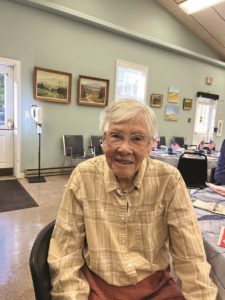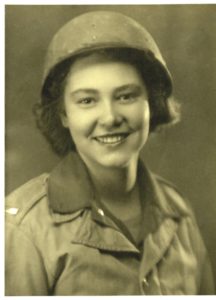EASTHAM — The 48th Field Hospital Second Medical Unit of the U.S. Army landed on Utah Beach in Normandy on June 15, 1944, nine days after D-Day. Shadowing the Second Armored Division as it advanced through France, Belgium, and into Germany, the medics tended the wounded and comforted the dying. Dana Manoogian, who now lives in Brewster, was there.
Manoogian was honored at this year’s Veterans Day luncheon at the Eastham Council on Aging. Now just shy of her 100th birthday, Manoogian, who was from the small town of Burkeville, Va., was a student in the Lewis Gale Hospital’s nursing program in Roanoke when the Japanese attacked Pearl Harbor on Dec. 7, 1941. She was 21 when she landed in Normandy.

A history of the field hospital at the World War II U.S. Medical Research Centre describes the nurses’ trajectories: They received training at Fort Sill, Okla. From there, they went to England where they set up a hospital unit in blackout conditions and bivouacked in preparation for their move to the front.
Conditions on the continent were harsh. In Belgium, if it wasn’t rain and wind, it was “enemy ‘flying bomb’ activities.” In Germany, it was frostbite.
Altogether, Manoogian served five months in the U.S. and 19 months in the European theater. She was assigned to post-op and operating rooms from Normandy to Germany. She felt prepared for duty, she said last week, because of the quality of her training. And when she was offered a commission as a second lieutenant to serve as an Army nurse, she accepted, she said, “because that is where the action was.
“The hospital was inside a tent,” Manoogian said. When the wounded came in, there was no time for elaborate pre-operative preparations. “We would not remove their clothes,” she said. “We would just cut the fabric around their wounds, clip, clean, and operate.
“We would move from battle to battle,” she continued, “and it was always busy, always an emergency. You didn’t have time to think about it being hard.”
Manoogian’s son, Sam, who has been living in the family’s house in Eastham since he and his wife, Mary, came from North Carolina to be closer to his mother during the pandemic, joined her at the Veterans Day event. His mother did not talk a lot about her wartime experience when he was growing up, Sam said.
Just once, he remembers, she spoke about holding a soldier as he died. He had been wounded by explosives. “She just blurted it out,” he said, “but didn’t mention it again.” More often, though, she would describe the everyday hardships — how, during surgery, the lights would go out after a bomb strike, for instance.

The 48th Field Hospital moved as the changing circumstances of the war dictated, the nurses living in tents, mostly, but sometimes billeted in semi-ruined houses evacuated by German civilians.
Manoogian recalled that in the winter of 1944 the nurses of the 48th found an abandoned house to live in. As the weather warmed, an awful smell began to permeate the place. Spring was being announced by the smell of a thawing and decomposing cow that, somehow, was in the basement.
Although Manoogian remembers meeting Gen. George Patton, who commanded the armored divisions during the Battle of the Bulge, and she remembers Gen. Dwight Eisenhower giving a brief talk at a field hospital, she said she remembers even more clearly the fact that “we took ‘baths’ in our army helmets.” It’s a memory she would bring up whenever power outages followed winter storms in Eastham, Sam said.
As the war wound down in 1945, varied forms of entertainment and recreation became available to the hospital personnel. According to the research center history, movies were scheduled, beer parlors were set up, and passes and furloughs were distributed for visits to Brussels, Paris, and the French Riviera. Recalling those months of newfound freedom and pleasure that arrived as the soldiers were sent home and the nurses stayed behind, Manoogian’s face beamed.
Manoogian — whose name back then was Dana Barron — continued working as a nurse after the war, first with a traveling orthopedist in Virginia, Tennessee, and the Carolinas. Her experience must have showed, her son said. One day, assisting in an operating room in Richmond alongside a young resident named Michael Manoogian, Sam recounted, “The surgeon turned to her and said, ‘Close this patient up.’ ”
It “rankled him a bit” that she had held a higher rank than his, said Sam about his father. He proposed twice, and she turned him down both times. Only later, when he spoke of moving back to his hometown of Worcester, did she suggest they get married. Which they did in 1948. The couple built their house in Eastham in the mid-1960s.
The war ended 77 years ago, but Manoogian still has her Army trunk and her field jacket. She also brought home a German Luger, which she gave to her father. He bragged about having it, she says, and soon thereafter it was stolen.
Manoogian says she is proud of her service. One last thing, she notes: she was not a WAC (in the Women’s Army Corps) but simply, and always, an Army nurse.



